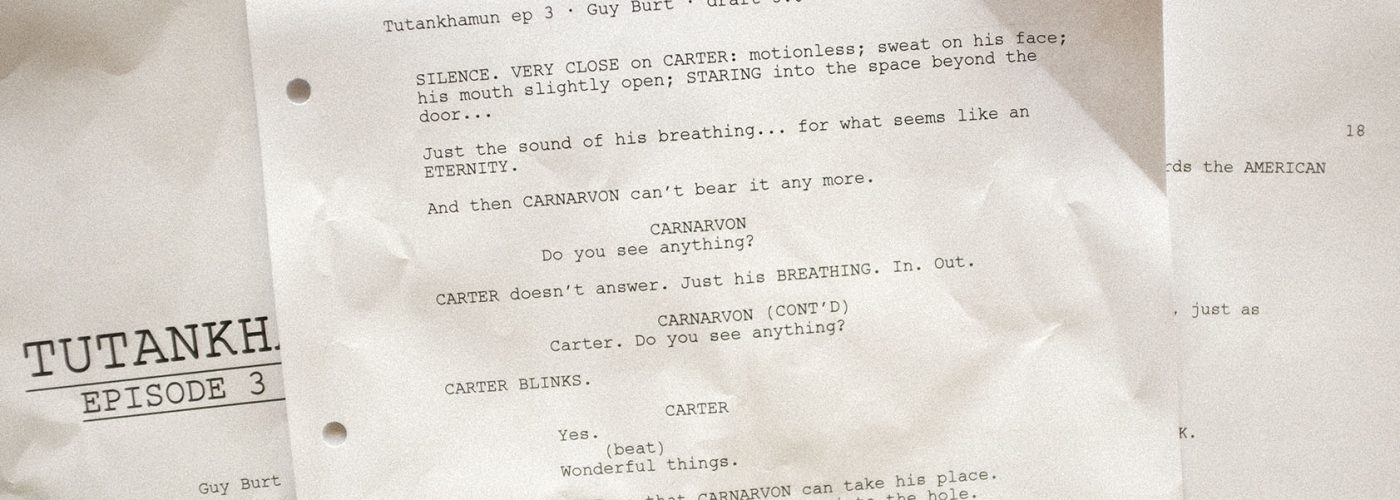Screenwriting
Writing for screen
My first experience of writing for screen was trying to adapt my own novel, After the Hole, as a feature film. I’d never read a film script and had no idea what I was doing: the result was 220 pages long and read like a novel. The director, Nick Hamm, gave me a stack of other people’s screenplays to read – including Four Weddings and a Funeral – and as I worked through them I started to see just how different novels and screenplays can be.
My version of the script for After the Hole wasn’t, in the end, the one that was used for the film; but the experience was a vital one for me. It introduced me to the world of screenwriting, it showed me how screenplays work, and it gave me a feel for just how strange it can be to have your own book adapted by someone else. All of these are lessons I’ve been putting to use ever since.
My first television drama was written in 1999 for a season of short films on Channel 4. It was called The Visitor and starred a young Daniel Craig as a charismatic stranger who cons his way into the lives of a group of housemates (they think he’s someone’s cousin; in fact, he sees them as easy targets). It was a kind of dark fairy-tale set in contemporary London. Again, I learned a lot writing it: the production company were great at holding my hand!
And that was the start of a career in writing for screen. Since then I’ve written more original dramas (including The Bletchley Circle, Tutankhamun and others); episodes of major series (like The Borgias and Wire in the Blood); work aimed at young viewers (Harriet’s Army); and adaptations of other people’s novels (Alex Rider, Joe All Alone). I really enjoy the work, and screenwriting is always fun and challenging.

As well as looking different on the page, novels and screenplays involve very different working practices. Novels are solitary experiences where you, the writer, are in sole charge of the world you create and the characters who inhabit it. The challenge is to bring that world and those characters vividly alive for a reader, and that challenge rests entirely on your shoulders.
Screenplays are far more collaborative. There is far more feedback in the writing process – notes from the production company, the director, the broadcast network and others. And the best screenplay in the world still needs great actors, a director on top form, sympathetic design, powerful cinematography and camera work… the writer is just one part of a much bigger team.
I love both forms because they stretch different writing muscles and require different disciplines. In my heart, I’ve always been a novelist first. The central challenge of the novel is to evoke for the reader the internal world of a character – their feelings, thoughts, hopes, fears – in such a way that those emotions resonate fully. To do this, you have to immerse yourself thoroughly, deeply, in the world of the book and of the character. It’s an entirely different way of writing from screenwriting; much less bound by form and structure, and asking more of the writer in terms of emotional engagement. When it works, it’s the best feeling in the world.
But screenwriting has its own set of demands, challenges and rewards. Working as part of a team feels unusual for a writer; and it’s exciting. The creativity that actors, directors, designers, musicians and producers bring to the process is often inspiring and surprising, enhancing the story in ways you might not have imagined.
BAFTA winner
This is my acceptance speech for Harriet’s Army, a television drama about children during the First World War. I was hugely proud to have written this story, and especially pleased because it was brought to life so vividly by the team who made the show.
Another project, Joe All Alone, adapted from Joanna Nadin’s novel, won a Best Drama BAFTA two years later.
Comic Con
Taking some questions onstage alongside Alex Rider author Anthony Horowitz. This was at ComicCon, where we were introducing the new Alex Rider adaptations to the audience. I was showrunner and writer for all three seasons of the show and it was tremendous fun connecting with all the fans of the books. Plus, my inner nerd is always happy to be at Comic Con. (If you want to see the whole 30-minute Q&A session, it’s here.)
Screen projects
This is a list of all the screen projects I’ve been involved with. In some cases, they’re entirely my own work; in others, I’ve written one or more episodes of an existing series. You can also check out my IMDB page for more detail on the actors and crew involved in each project.
- Alex Rider (2020-24) – all 24 epsiodes (writer & exec producer)
- Medici (2019) – 2 episodes (writer)
- The Bletchley Circle San Francisco (2018) – 8 episodes (exec producer)
- Joe All Alone (2018) – all 4 episodes
- Riviera (2017) – 2 episodes
- Tutankhamun (2016) – all 4 episodes
- Beowulf: Return to the Shieldlands (2016) – 6 episodes
- Jekyll & Hyde (2015) – 1 episode
- Harriet’s Army (2014) – all 3 episodes
- The Bletchley Circle (2012-14) – all 7 episodes
- The Borgias (2012-13) – 5 episodes
- Kingdom (2008-09) – 3 episodes
- Diamond Geezer (2007) – 1 episode
- Afterlife (2006) – 1 episode
- Wire in the Blood (2005-06) – 2 episodes
- Ghostboat (2006)
- Murder in Mind (2001-03) – 3 episodes
- The Hole (2001) – adapted from my novel After the Hole
- The Visitor (1999) – part of Shockers short film season